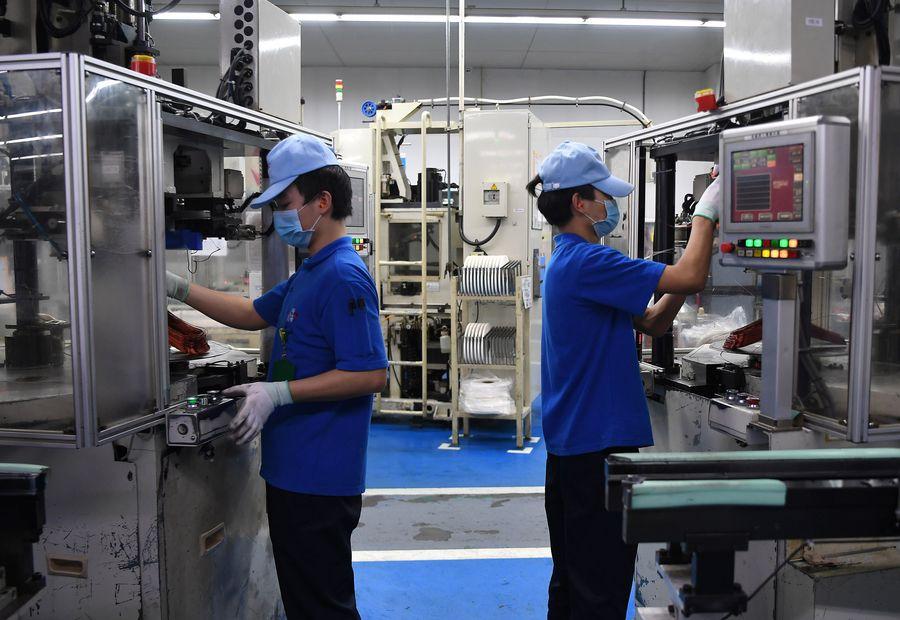NANCHANG, March 31 (Xinhua) -- In Yixiang Agricultural Products Co., Ltd., truckloads of fresh duck eggs are being sorted, washed, processed, packed and ready to be delivered to customers across the country.
The company in the city of Ruichang, eastern China's Jiangxi Province, has gradually resumed production, after it was brought to a standstill for over a month amid the coronavirus outbreak.
Yixiang is a top egg-processing company in China with an annual output of over 100 million eggs. Their products are sold to over 20 provincial-level regions within the country and exported to many other countries.
"This is the biggest crisis we have ever faced since the company's establishment 13 years ago," said He Xueping, general manager of the company. All the 190 employees had returned to their posts on Feb. 13, but she found that work resumption is much more than having enough hands.
The company's upstream raw material suppliers were hit hard, feed prices surged, farmers ran short of funds, and logistics service was still slow.
"We realized that we cannot simply resume operation on our own. Only when everyone gets their machines roaring can the industrial chain operate well," she said.
Yixiang therefore decided to take out 3 million yuan (about 423,000 U.S. dollars) as interest-free loans to help farmers survive capital shortage and reduce losses. They also worked with local authorities to launch a green channel to transport fodder and other necessary materials to keep farms running.
"The money was a real help in the nick of time," said Zhang Huixuan, a duck farmer in Huangjin township. Zhang raises nearly 4,000 ducks and borrowed a total of 60,000 yuan from the company to tide over the difficulties. The company helped over 30 duck farmers like Zhang.
In addition to offering financial support to farmers, Yixiang also extended payment deadlines for downstream sales companies. With the whole industrial chain running, the company now receives over 10,000 orders each day and the sales volume hit almost 15 million yuan in February, up 60 percent from the previous year.
Enterprises in China are taking a special test amid the epidemic. Small and medium-sized enterprises (SMEs), in particular, bear the brunt as production is delayed, cost is rising and the capital is often not enough.
SMEs, which are vulnerable during the outbreak but contribute more than 80 percent of the job opportunities in China, have therefore been provided with an array of policies to ease their cash strain, such as temporary exemption of social insurance payments, and low-interest loans.
About 76 percent of all SMEs in China have resumed work as of March 28, according to the Ministry of Industry and Information Technology.
The ministry also encouraged leading enterprises to give a hand to SMEs to fast-track work resumption across the industrial chain.
"In addition to the supportive policies from the government, we're also actively helping local SMEs to look for a way out," said Hu Chunlin, chief executive officer of a leading packaging company in Xiangdong district in the city of Pingxiang.
Color printing and packaging is a traditional pillar industry in Xiangdong district, which is home to over 100 packaging enterprises. Tea packaging, for example, takes more than 80 percent of the national market share.
March is the golden time to make spring tea, but the coronavirus outbreak has led to a 35-percent contraction in tea-packaging orders, taking a heavy toll on SMEs.
Leading enterprises like Hu's company have therefore been lending a hand to their peers by sharing orders to keep their production lines rolling.
The same can be seen across the nation. Trip.com Group, China's largest online travel agency, exempted about 8,000 stores on its platform from management fees for three months, while e-commerce giant Alibaba waived all Tmall merchants' platform service fees for the first half of 2020.
"Apart from the support from the government, enterprises should also stick together to pull through the 'winter' of COVID-19 and embrace the spring," said Zhou Dewen, vice president of China Association of Small and Medium Enterprises.




 A single purchase
A single purchase









